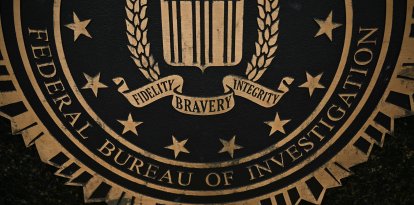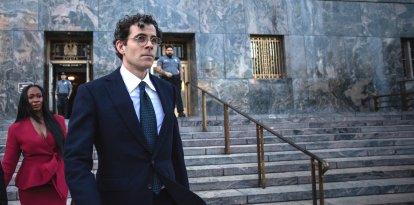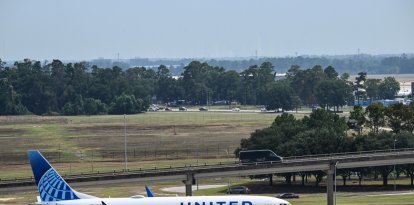The Jalisco New Generation Cartel is taking constant hits from the United States, but is it really weakening?
The Sinaloa Cartel issued a strange threat months ago in its territory: Stop manufacturing fentanyl or die. Could the battle against organized crime be working?

(Christian Camacho / VozMedia)
Amid a bloody public health crisis generated by fentanyl trafficking, the United States continues its intense fight to dismantle the two most powerful criminal organizations in Mexico: the Jalisco New Generation Cartel (CJNG, for its initials in Spanish) and its biggest rival, the Sinaloa Cartel.
Between 2022 and 2023, the DEA led a brutal effort called “Operation Last Mile,” where, in collaboration with federal, state and local law enforcement partners, the anti-narcotics agency arrested 3,337 people linked to both criminal organizations in addition to the seizure of almost 44 million fentanyl pills. This investigation showed that, among other situations, the trafficking of this potent opioid that causes more than one hundred thousand deaths annually in the United States is no longer only marketed through common micro trafficking carried out by gang members but also by social networks such as Facebook, Instagram, TikTok, Snapchat, WhatsApp, Telegram, Signal, Wire and Wickr.
These two cartels, directly responsible for the massive fentanyl trafficking to the United States from Mexico, have been in the sights of the United States authorities at different levels for years. Still, the territorial expansion of the CJNG in Mexico, which has increased the levels of violence in the areas where the Sinaloa Cartel operates, added at their disposal for continuing to traffic fentanyl and other hard drugs; they are taking the authorities’ concern to the next level.
Specifically, there are already Republican legislators requesting that the authorities classify these criminal groups as “terrorists,” an effort that generates strong opposition in Mexico and that confronts global security experts because it could put at risk the collaboration between the security agencies of both countries in the fight for drug trafficking.
“Mexican drug cartels continue to kill Americans at a rate higher than any terrorist group in history. Even by the standards of drug cartels, the Jalisco New Generation Cartel is especially violent and poses a direct threat to the security of Americans in border states and beyond. It’s past time that the Biden administration develops a strategy to hold these murderers accountable,” said Republican Senator Tom Cotton.
However, even though fentanyl trafficking is advancing, the United States has managed to impact the CJNG with sentences, arrests and sanctions on suppliers of the chemicals and materials necessary to manufacture the drug in Mexico.
The Jalisco Cartel takes hits, but is it weakening?
Last December, Treasury Secretary Janet Yellen announced that the United States imposed economic sanctions on three people and 13 Mexican companies linked to the Jalisco New Generation Cartel located especially in Puerto Vallarta, western Mexico.
Likewise, in June 2023, the Department of Justice announced economic sanctions against four Chinese companies and eight of their executives that are responsible for the production, distribution and sale of products considered chemical precursors to fentanyl.
The authorities identified the companies as Hubei Amarvel Biotech, Anhui Rencheng Technology, Anhui Moker New Material Technology, and Hefei GSK Trade. All of them have supplied the Jalisco New Generation Cartel (CJNG) and the Sinaloa Cartel.
However, there are not only financial blows but also logistical ones and those from the middle-ranking “soldiers” of the group.
On April 23, the United States Attorney for the Northern District of Texas, Leigha Simonton, announced that Francisco Javier Rodríguez Arreola, a major drug trafficker linked to the CNJG, was sentenced to 40 years in federal prison for possessing and intending to distribute methamphetamine after he admitted that he helped coordinate the shipment of a load of 440 pounds (199.97 kg) of liquid methamphetamine (with a street value of up to $9.9 million).
Eleven other drug traffickers were sentenced along with Rodríguez Arreola, who stood out for being a key figure who had access to the highest levels of the CJNG since he was associated with members of the organization who reported directly to the infamous leader of the cartel, Nemesio Oseguera Cervantes, alias “El Mencho,” one of the most wanted criminals in the United States and whose reward is currently at $10 million.
Likewise, at the beginning of the month, the Department of Justice announced the arrest of 23 people based on a 50-count indictment against 41 suspects for trafficking cocaine, fentanyl, heroin and methamphetamine and related crimes in the areas of Houston, Galveston, New Orleans, Pensacola, Atlanta, Nashville and Chicago. All of these people are linked to the CJNG, and according to the accusation, they operated and distributed drugs smuggled into the United States from Mexico between December 28 and April 22, 2020.
“The fentanyl threat to America constitutes a public health, public safety, and national security threat, and it’s primarily fueled by Mexican drug trafficking organizations, including the prominent and deadly Jalisco cartel,” said Assistant Attorney General Lisa Monaco. “The charges and arrests announced today target every element of the Jalisco cartel’s trafficking network, reflecting the Justice Department’s urgent and relentless battle, along with our Mexican partners, to dismantle all aspects of the illicit fentanyl supply chain.”
This alliance between Mexico and the United States has borne certain fruits in the last year, with a strategy that some security experts describe as successful but others believe to be insufficient: the capture of relatives close to the drug lords, in this case of “El Mencho.”
On April 22, the Mexican authorities announced that the National Guard captured Abraham Oseguera Cervantes, brother of “El Mencho,” in the west of the country, who had a discreet —but fundamental— administrative role in the shipment of drugs from the Jalisco cartel to the United States.
Despite the low profile that the brother of the CJNG leader maintained for several years, reports from the Secretariat of National Defense (Sedena) argued that Oseguera Cervantes is a key element for the operations of the criminal group, being in charge of logistical activities and financial, as well as the supervision of fentanyl routes used by the transnational criminal organization.
It is unknown if this brother of “El Mencho” will be extradited to the United States, but security experts do not rule out the possibility. Furthermore, Abraham is not the only relative of “El Mencho” recently captured by the authorities, as Antonio Oseguera Cervantes, another brother of the drug lord known by his alias ‘Tony Montana,’ was also arrested in December 2022.
According to the specialized portal InSight Crime, this strategy is not new and has failed on other occasions.
In fact, according to US records, Abraham Oseguera previously served time in California in the mid-1990s for heroin trafficking before being released and deported to Mexico. His brother, Antonio, suffered the same fate in the nineties, and they are not even the only relatives of “El Mencho” who have been captured.
“Another of the family members who have been detained is Rubén Oseguera González, alias’ El Menchito,’ son of El Mencho. Oseguera González had been designated as one of the heads of the CJNG and was first captured in a large-scale military operation in Guadalajara in January 2014. He was released before being recaptured in July of that year and six years later he was extradited to the United States,” states InSight Crime. The tactic deserves questioning because, according to InSight Crime, although they are popular measures, there is no substantial evidence that weakening the organizations by arresting the leader’s relatives works to neutralize their operations.
“There is little evidence to suggest that decapitating organizations in this way will have a significant impact on the development of their operations. Furthermore, it contradicts the negotiation strategies where security forces offer immunity to the relatives of drug traffickers in exchange for their cooperation in criminal investigations.”
This analysis of the specialized portal is based on the fact that the Sinaloa Cartel, archenemy of the Jalisco New Generation Cartel, has also seen how the authorities search, capture and sentence their relatives to try to dismember the organization from within, but without achieving greater progress in stopping criminal activities boosted by the border crisis and the high demand for fentanyl in the United States.
Both cartels, despite their continued fight that has caused a bloodbath in Mexico and the displacement of hundreds of thousands of people, remain the most powerful cartels in the neighboring country.
Is the battle against organized crime working?
US law enforcement agencies were clear: the CNJG and its rival, the Sinaloa Cartel, are present in all 50 states in the country, the DEA admitted in its 2024 National Drug Assessment.
In its assessment, the DEA notes that the two criminal organizations considered the most powerful in Mexico, are involved in “arms trafficking, money laundering, migrant smuggling, sex trafficking, bribery, extortion, and a host of other crimes – and have a global reach extending into strategic transportation zones and profitable drug markets in Europe, Africa, Asia, and Oceania.”
However, although US efforts appear overshadowed by the advances of cartels like the CJNG, which has a presence in four distribution centers in major cities (Seattle, Chicago, Los Angeles and Charlotte), the maximum pressure strategy in the fight against fentanyl trafficking prompted the Sinaloa Cartel to send a message to manufacturers of the opioid in its territory: stop making fentanyl or die.
Members of the Sinaloa Cartel contacted The Wall Street Journal and revealed in October 2023 that the group is prohibiting the production of fentanyl in its territory as a result of pressure from US authorities regarding trafficking the powerful opioid. The order came directly from the “Chapitos” faction, the group led by the four sons of the famous imprisoned drug trafficker “El Chapo” Guzmán.
“In Sinaloa, the sale, manufacture, transport or any kind of business involving the substance known as fentanyl, including the sale of chemical products for its elaboration, is permanently banned,” read one of the banners seen in Culiacán, Sonora and Tijuana. “You have been warned. Sincerely yours, the Chapitos.”
The group’s intention, according to the WSJ, is to avoid the intense pressure applied by the US authorities against the group and that it falls mainly on the CJNG, which continues to traffic the opioid across the southern border.
“For the many people in this northwestern Mexican region who make a living producing and smuggling an opioid that has killed tens of thousands of Americans, the message was clear: stop or die,” the WSJ reads. “In June, when the shift away from fentanyl began, three bodies covered with blue pills of the drug appeared on the outskirts of Culiacán.”
However, some US officials are skeptical that the strange and unprecedented order will be maintained over time, considering it part of a public relations strategy by the cartel that, in practical terms, will not have much impact on fentanyl production.

























